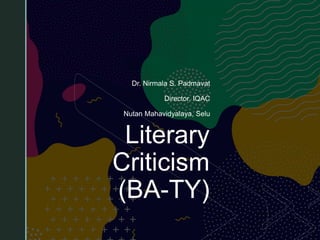
Literary Criticism- Dante.pptx
- 1. z Literary Criticism (BA-TY) Dr. Nirmala S. Padmavat Director, IQAC Nutan Mahavidyalaya, Selu
- 2. z Early Life Dante Alighieri, often referred to simply as Dante, was an Italian poet, philosopher, and political thinker of the late Middle Ages. He is best known for his epic poem "The Divine Comedy." Dante Alighieri was born in Florence, Italy, around 1265. The exact date of his birth remains uncertain. He came from a family of minor nobility and received a good education, studying grammar, rhetoric, and philosophy. As a young man, Dante was deeply influenced by the works of ancient Roman writers, especially Virgil and Cicero, as well as the troubadour poetry of the time.
- 3. z Literary Work Dante's most renowned literary work is "The Divine Comedy" (La Divina Commedia). It is a monumental poem consisting of three parts: "Inferno" (Hell), "Purgatorio" (Purgatory), and "Paradiso" (Heaven). "The Divine Comedy" is an allegorical journey through the afterlife, where Dante, the protagonist, travels through Hell, Purgatory, and Heaven, guided by the poet Virgil and later by his idealized love, Beatrice. The poem is not only a spiritual and theological exploration but also a profound reflection on human nature, politics, and the divine order of the universe. Written in the Tuscan vernacular (common Italian), "The Divine Comedy" played a significant role in establishing the Italian language as a literary medium and contributed to the development of modern Italian literature.
- 4. z Other Literary Works Dante's earlier works include "Vita Nuova" (The New Life), a collection of poems centered on his love for Beatrice and his emotional and spiritual growth. He also wrote various philosophical and political treatises, including "De Monarchia" (On Monarchy) and "Convivio" (The Banquet). "De Monarchia" argues for the necessity of a universal monarch to achieve world peace, while "Convivio" is a collection of essays on various subjects, written in Italian rather than Latin to make knowledge accessible to the common people.
- 5. z "The Divine Comedy" "The Divine Comedy" is an allegorical journey through Hell (Inferno), Purgatory (Purgatorio), and Heaven (Paradiso), and it contains elements of social and political commentary, moral reflections, and theological insights. However, it is not a formal treatise on literary criticism or a systematic exploration of literary theory. Dante Alighieri, the renowned Italian poet of the Middle Ages, is best known for his epic poem "The Divine Comedy." While Dante did not write a specific treatise on literary criticism, his views on literature and poetry can be gleaned from his works and letters.
- 6. z The Use of Vernacular Language Dante's choice to write "The Divine Comedy" in the Tuscan vernacular (common Italian) instead of Latin was a revolutionary decision. This choice made his work more accessible to a broader audience and contributed to the development and recognition of the Italian language as a literary medium.
- 7. z Allegory and Symbolism "The Divine Comedy" is heavily allegorical and symbolic. Each part of the journey, Inferno, Purgatorio, and Paradiso, contains layers of meaning and represents various moral, political, and theological concepts. Dante's use of allegory and symbolism enhances the depth and complexity of his work.
- 8. z Ethical and Moral Themes Dante's poem is deeply infused with ethical and moral themes. He explores the concepts of sin, redemption, divine justice, and the consequences of human actions. Through his vivid descriptions of the afterlife, he provides moral lessons and reflections on human nature.
- 9. z Personal and Political Commentary Within "The Divine Comedy," Dante includes references to contemporary political figures and events. He uses his epic journey as a platform to express his opinions and criticism of the political and social conditions of his time, often expressing his disdain for corruption and abuses of power.
- 10. z The Power of Literature Dante believed that literature, particularly poetry, had the ability to convey profound truths and shape the minds and hearts of readers. His work aimed to inspire moral growth, intellectual contemplation, and spiritual reflection in his audience.
- 11. z The Role of the Poet Dante envisioned the poet as a guide and teacher, leading readers on a journey of discovery through their words. He saw the poet's role as not just a creative artist but also a moral authority, imparting wisdom and insight through their work.
- 12. z Criticism of Rival Poets: In his "De Vulgari Eloquentia" (On Eloquence in the Vernacular), Dante engaged in literary criticism by critiquing the work of other contemporary poets. He sought to elevate the status of the Italian language and literature while critiquing the excesses and superficiality of certain poetic styles. While Dante's direct writings on literary criticism might be limited, his poetic masterpiece "The Divine Comedy" serves as a testament to his profound understanding of literature's potential for moral and intellectual impact. Through his innovative use of language, allegory, and symbolism, Dante has left an indelible mark on the development of literature and literary criticism in the Western tradition.
- 13. z Conclusion "The Divine Comedy" is an allegorical journey through Hell (Inferno), Purgatory (Purgatorio), and Heaven (Paradiso), and it contains elements of social and political commentary, moral reflections, and theological insights. However, it is not a formal treatise on literary criticism or a systematic exploration of literary theory. Dante's contributions to literature and literary criticism primarily lie in his use of the Italian vernacular, the allegorical structure of his poem, and his exploration of complex moral and philosophical themes. These aspects of his work have had a significant impact on the development of Italian literature and the broader literary tradition.
